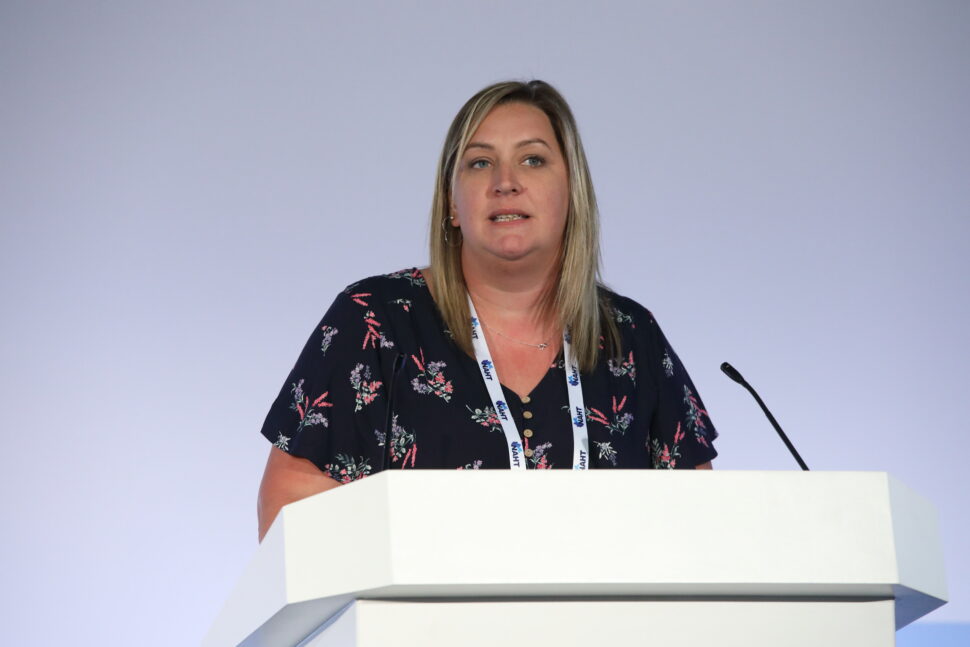Ministers “mustn’t forget to dream about the legacy they want to leave, as much as the desire to balance the books”, NAHT leader Paul Whiteman has said, as he called on ministers to properly fund schools.
The leader of the NAHT leaders’ union warned the government its “vision for education, the ambition for our children, for our country’s future cannot start with your bank balance.
“If we fail to invest in education, we fail to invest in our future.”
Here’s your Schools Week round-up of the big talking points from leaders at the conference.
‘Sleepless nights over another unfunded pay rise’
A motion on funding warned of “growing budget deficits, leading to long-term financial instability in schools”.
Debra Walker, the CEO of the IRIS Learning Trust, said the “leadership model in our system is on the edge of a precipice.

“Another unfunded pay rise will be catastrophic for us all. We are having sleepless nights about what we can and cannot do.”
Headteacher Simon Smith added that funding formulas focused on headcount also “don’t match the needs in schools”.
He said his school had eight fewer staff than four years ago, despite “more children with SEND”.
David Pattison, from Leeds, warned of the impact of falling rolls.
“If you have 23 children in a class, you still need a class teacher, but the funding model does not reflect this.”
He added that schools dread the “transfer deadline day” of the school census, “where there is so much churn as schools try to ensure they have full rolls”.
Pattison said: “Schools are being forced into impossible financial decisions, diverting money away from core education priorities just to keep the lights on and ensure children are fed. We in schools are under constant pressure to do more with less. This is unstainable.”
Simone Beech, head of Sacred Heart Catholic Primary School in Barrow-in-Furness, Cumbria, said she’d “had no school building” since January 16, 2023, “when we were told to leave immediately because it was deemed unsafe.
“Our budget was balanced on the day of the evacuation, but it isn’t balanced now.”
Academies ‘shuffled between MATs like monopoly cards’
Delegates passed a motion calling for a process “for a school to leave one trust and either join another or rejoin the local authority, to suit the school’s needs”.
Alasdair Black, head of Moat House Primary School in Coventry, warned some academies were being “shuffled between MATs like property cards in a Monopoly board”. But the current situation was akin to “marriage without the prospect of divorce”.

Currently there is no mechanism for a school to choose to leave a trust – moves only happen due to intervention after poor performance or if a trust decides it no longer wants to run a school.
Michelle Sheehy, of Millfield Primary School in Walsall, said the current setup means the proposed policy would be “very difficult to put into practice”.
She added: “Headteachers, when they do join a MAT, often lose any say in what happens to them subsequently. But I think something does need to be done to ensure the leaders of the school, the school heads themselves, get to choose what happens in terms of structure.”
Academy leaders ‘demonised’
While excessive CEO pay was criticised, others were also concerned about academy criticism.
Debra Walker criticised the “demonisation of us as leaders and workers within the academy system”.
“There are some rogue people out there, but we cannot tarnish the whole system,” she added.
And Jim Nicholson of Stockport said “the majority of CEOs actually do hard work for the children.
“Many CEOs actually are paid less than some of our primary school colleagues in charge of individual schools in the maintained sector. We have to stop that rhetoric.”
Ofsted ‘glimmers of hope are now in the shadows’
The NAHT’s motion on Ofsted calls on the union to consider all “legal and industrial options” in fighting the watchdog’s plan for new report cards, which would give schools one of five grades in up to 11 inspection areas. The union has since launched legal action.
Martin Vayro, of Crow Lane primary school in Milnsbridge, Huddersfield, said heads were given a “glimmer of hope” when Sir Martyn Oliver was appointed chief inspector and the Labour government was elected.
But “in the here and now, those glimmers of hope are in the shadows”.
He said the plan for report cards was “an idea that was set up in Nando’s, written on the back of a serviette, taken back into the office and run through ChatGPT”.

Donna Taylor-Smith, head of Stansfield Hall Church of England in Littleborough, Gtr Manchester, said her school was rated ‘good’ in all areas last year, but then inspectors returned to gather additional evidence.
“The lead inspector called not to collaborate, but to dictate. There was no discussion, no understanding, just control.”
What followed was “one of the most traumatic 48 hours of my professional life. I didn’t sleep. I was at school at 4am shovelling snow, terrified that they would defer us.
“My staff were shattered and I was broken. By midday, the inspectors told me that they had no concerns. They praised our journey, but the damage was already done.”
‘Remove last remnant of performance-related pay’
Delegates passed a motion stating that performance-related pay in England “has been removed for everyone except those on [main pay scale point six].
This is because teachers “still have to apply” for the upper pay scale, and this is subject to a judgment.

Amy Lassman, of Birmingham, said all teachers “develop well when they are supported and able to take part in meaningful professional development.
“Over time, their skills develop, they support others, they become better teachers. This should be rewarded with a fair and equitable pay scale that recognises commitment and experience.”
But Clem Coady from Cumbria warned that if the policy changed, “wages will go up… but the school funding will never match it, and therefore, members in this room will be making colleagues redundant to pay for this”.
‘Teaching apprentices just surface-level instructors’
The government is developing teaching degree apprenticeships, which will allow those without an existing degree to train to become teachers. They will obtain a degree and qualified teacher status at the end of the four-year course.
NAHT conference voted to “oppose the introduction and expansion of non-graduate apprenticeship routes as a substitute for high-quality, university-led teacher training”.
The only basic entry requirements are that applicants must be over 16 and have passed GCSE English and maths. The number of A-levels or equivalent qualifications “will be set by individual universities”.

Emily Jones, from Staffordshire, asked delegates to “imagine hypothetically” a non-graduate apprentice teacher working with pupils with additional needs.
“No required specialist knowledge, no required understanding of pedagogy, psychology, differentiation, SEND needs and the true grit required to work with such people. A 60 per cent teaching commitment and a 40 per cent study.”
She said the union’s executive had questioned the government, and “there are far too many holes in this poorly thought out solution to our recruitment crisis”.
“Will this reduce workload for schools? Absolutely not. Will this increase our workforce solving all of our recruitment issues? I very much doubt it.”
Toni Dolan, of Barnsley, questioned how apprentice teachers would identify learning gaps “if they do not have any strong sound subject knowledge specific to their teaching area.
She added: “They will just be surface-level instructors.”
But George Samios, of Bath, pointed out trainees often take on debts of £9,000 to do a PGCE or up to £50,000 for a teaching degree.
He argued we should not place “additional barriers in the way of good people, whatever their circumstances, doing something meaningful and vital.”








Your thoughts